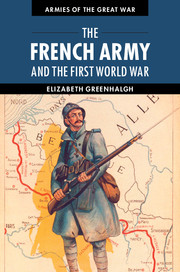Book contents
- Frontmatter
- Contents
- List of figures
- List of maps
- List of tables
- Preface
- List of abbreviations
- Introduction
- 1 The pre-war Army
- 2 1914: From the frontiers to Flanders
- 3 1915: On the offensive
- 4 1916: Verdun and the Somme
- 5 General Nivelle and his 1917 offensive
- 6 Restoring the Army
- 7 1918: German offensives
- 8 The path to victory
- 9 Armistices and demobilisation
- 10 From 1914 to 1919: Aux armes, citoyens!
- Notes
- Bibliographic essay
- Index
3 - 1915: On the offensive
Published online by Cambridge University Press: 05 November 2014
- Frontmatter
- Contents
- List of figures
- List of maps
- List of tables
- Preface
- List of abbreviations
- Introduction
- 1 The pre-war Army
- 2 1914: From the frontiers to Flanders
- 3 1915: On the offensive
- 4 1916: Verdun and the Somme
- 5 General Nivelle and his 1917 offensive
- 6 Restoring the Army
- 7 1918: German offensives
- 8 The path to victory
- 9 Armistices and demobilisation
- 10 From 1914 to 1919: Aux armes, citoyens!
- Notes
- Bibliographic essay
- Index
Summary
In 1915 the French Army carried out a series of bloody and repetitive attacks from their own trenches against those of the entrenched enemy opposite. Attempts were made by various means to break the stalemate. These were technological (the development of new weapons) and doctrinal (the development of better tactics both in attack and in defence). Politics and diplomacy were invoked also. The politicians had returned to Paris from Bordeaux, and they attempted to impose closer control over what the army’s high command was doing, thereby preventing the worst (to political eyes) military errors; diplomacy consisted essentially of bribing new members into joining the alliance. So the struggle to improve the conditions under which the war was being conducted by all, from the poilu in the trenches to the premier and President of the Republic, dominated the search for victory. Yet the principle on which that search for victory rested remained the offensive.
Although the winter 1914/15 had shut down most fighting, already reduced in scale for lack of munitions, Joffre was determined that the fighting should not stop altogether. There were internal domestic reasons for his decision, as well as external ones. Domestically, the government’s return to the capital meant that the CinC and his staff faced parliamentary criticism over the costs to France of 1914’s events, costs that were both human in the huge numbers of killed and wounded, and material in the destruction of towns and the loss of manufacturing capacity, especially the mineral resources in north-eastern France where the loss of the iron-ore deposits in the Briey basin gave Germany a crucial advantage. The new war minister, Alexandre Millerand, provided Joffre with a counterweight to criticism, since he supported Joffre and the GQG wholeheartedly. Besides, the French Army could not simply sit idly by while the enemy took French citizens as hostages or helped themselves to French coal and iron-ore deposits and machine-tools.
- Type
- Chapter
- Information
- The French Army and the First World War , pp. 70 - 124Publisher: Cambridge University PressPrint publication year: 2014

